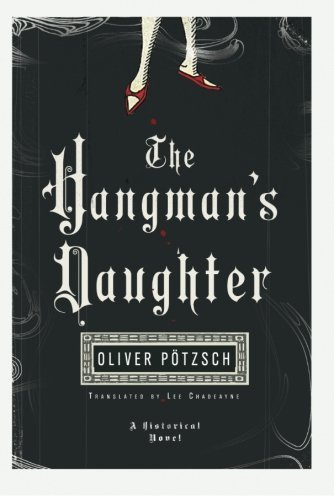 Oliver Potzsch's The Hangman's Daughter was our book club's choice for February.
Oliver Potzsch's The Hangman's Daughter was our book club's choice for February.The book (published by Amazon Crossing, interestingly enough) is written in German, translated to English by Lee Chadeayne. It is set in 1600s Bavaria, where a young boy has been found dead. A strange mark is found on his body, leading a local midwife to be accused of witchcraft. The killing keep occurring, and Jakob Kuisl, the town's executioner, is skeptical of the witchcraft accusation. With the help of his daughter, Magdalena, and the local physician's son, Simon, the hangman is determined to find who is responsible.
As I said in the book club discussion, I have never read a book that completely left me with no clue how I felt about it, but this one did exactly that. I finished it, thought I liked it, decided I didn't, thought maybe I actually did, decided that I in fact HATED it, then decided I didn't know. What?
Maybe I was just disappointed. It all seemed reeaaallly pointless... I spent 2 weeks reading a book that led me to believe it was about one thing, and then I found out in the last couple of chapters that it wasn't about that at all. It kind of irked me. I'd be spoiling a lot by explaining myself further, but just know that the whole answer to the mystery really ticked me off.
I had some issues with the translation and characterization. (Of course, the characterization may have been due to the translation, so...) Just little things that weren't quite worded right or seemed out of place for the time period. As I have mentioned before, as a history major, I try really hard not to be super academically critical of historical fiction, or else I'd never enjoy anything. It has to be pretty glaring for me to get really worked up over, and the inaccuracies in The Hangman's Daughter weren't a big deal at all. The characters (especially Jakob and Simon) felt very nondescript in terms of their time period. My brother pointed this out as well, so I'm glad to know it wasn't just me... They had very modern ways of thinking, not in terms of being "ahead of their time," because I realize that was the point, but in terms of feeling like they could be characters in a book set in 1860 or 1980 or 3014. That may be a good thing, depending on how you look at it, and I certainly realize that Potzsch was attempting to make them seem wiser than the members of their community, but it came across a bit off.
As I write, I guess it seems like I disliked this book more than I liked it... I'm (again) not sure if that's actually the case. I liked a lot of things about the story, especially at the beginning. For the most part, it kept me interested and made me want to keep reading... But, as I've said many times before, a disappointing ending will forever ruin a book for me... Still not over the last chapter of The Lovely Bones, which I read yeaaarrrss ago.
2.5/5 stars
Read from February 1, 2011 to February 12, 2011
--C
No comments:
Post a Comment